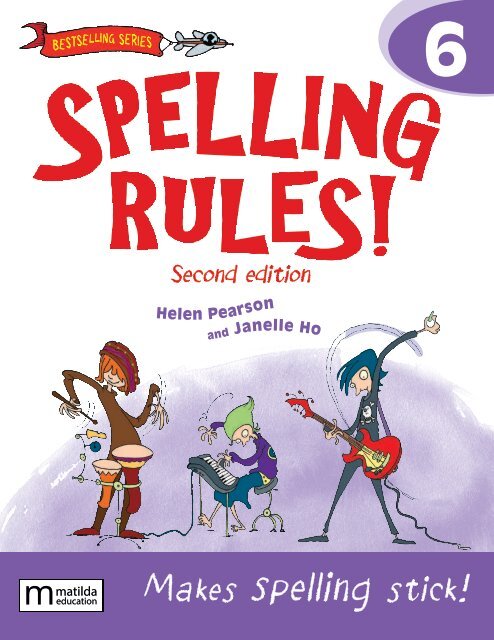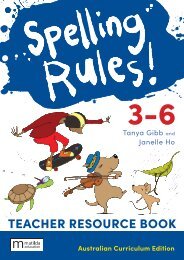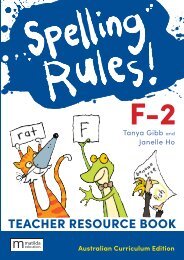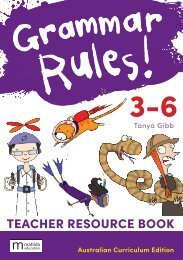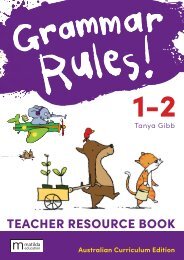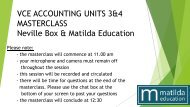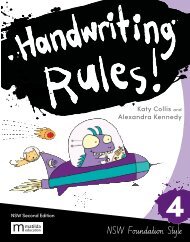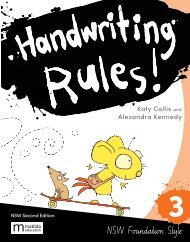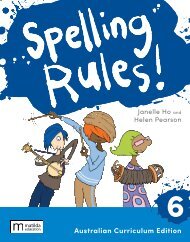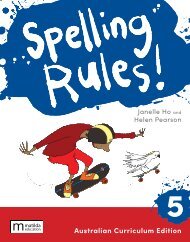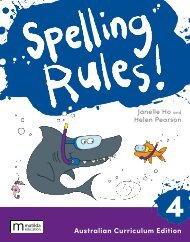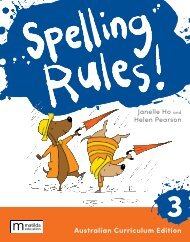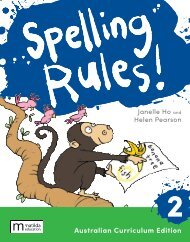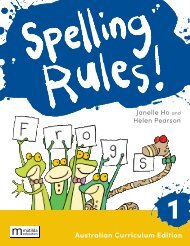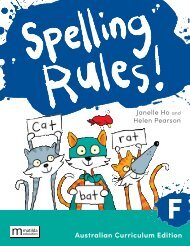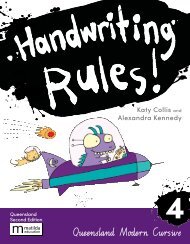Create successful ePaper yourself
Turn your PDF publications into a flip-book with our unique Google optimized e-Paper software.
BESTSELLI LING SERIES<br />
6<br />
Second edition<br />
Helen Pearson<br />
and Janelle Ho<br />
Makes<br />
spelling<br />
stick!
Second edition<br />
Helen Pearson<br />
and Janelle Ho<br />
STUDENT BOOK6<br />
Makes spelling stick!<br />
Name:<br />
Class:
Contents<br />
Scope and Sequence................................................................ 3<br />
Note to Teachers and Parents................................................... 4<br />
Units 1–35............................................................................... 6–75<br />
List Words in Unit Order.......................................................... 76<br />
List Words in Alphabetical Order.............................................. 78<br />
<strong>Spelling</strong> <strong>Rules</strong> and Tips.............................................................. 80<br />
SLLURP<br />
SLLURP summarises the spelling strategies that you can use to learn new words.<br />
Say<br />
Listen<br />
Look<br />
Understand<br />
Remember<br />
Practise<br />
Say the word carefully and slowly to yourself.<br />
Listen to how each part of the word sounds in sequence.<br />
Look at the patterns of letters in the word and the shape<br />
of the word.<br />
Understand rules, word meanings and word origins.<br />
Remember all the similar words you can already spell and<br />
relate this knowledge to any new word.<br />
Practise writing the word until it is firmly fixed in your<br />
long-term memory.<br />
2
Scope and Sequence This scope and sequence chart is based on the requirements of the Australian Curriculum.<br />
Skill focus<br />
Unit<br />
Page<br />
Sound-letter<br />
patterns<br />
1 6 ge, gi, gy, dge, j<br />
Prefixes and<br />
suffixes<br />
(morphology)<br />
Other<br />
morphology<br />
Etymology<br />
Homophones/<br />
Homographs/<br />
Confusing words<br />
Topic<br />
words<br />
2 8<br />
-ion: adding to t,<br />
nt, lve<br />
3 10<br />
-ion: adding to<br />
silent e, de<br />
4 12<br />
words ending in a vowel<br />
sound<br />
5 14 suffixes abbreviations premier, cabinet, minister government<br />
6 16<br />
7 18 er, ir, or, ur, ear, our<br />
8 20 -er, -or, -ian, -ist occupations<br />
-ity: adding to<br />
9 22<br />
ible, able<br />
10 24 confusing pairs<br />
11 26 affixes; -logy environment<br />
12 28<br />
13 30 ion, ior, ian, iar -ity<br />
14 32<br />
al, el, le -al serial/cereal,<br />
metal/mettle<br />
15 34 -ous<br />
16 36<br />
17 38<br />
-ic<br />
word elements<br />
scope, meter<br />
18 40<br />
REVISION<br />
19 42 -ion, -ation, -ition abbreviations<br />
nova, vox, notare,<br />
reminisci<br />
20 44<br />
ary, ery, ory<br />
salary/celery,<br />
summary/summery<br />
21 46<br />
word elements<br />
mono, multi, omni,<br />
poly<br />
22 48<br />
phone, onyma,<br />
patheia, magnus<br />
23 50 abbreviations organ, appendix medicine<br />
24 52<br />
25 54 cy -cy, ob-<br />
26 56 double consonants<br />
27 58 cc<br />
28 60<br />
adding multiple<br />
affixes<br />
29 62 suffixes; plurals non-English words money<br />
30 64<br />
31 66 sce, sci<br />
32 68 odd-<strong>look</strong>ing words<br />
33 70 non-English words<br />
34 72<br />
35 74<br />
REVISION<br />
REVISION<br />
REVISION<br />
REVISION<br />
novel<br />
science<br />
idioms astro space and<br />
time<br />
REVISION OF UNITS 1–34<br />
3
Some students are natural spellers. But the vast majority of students need formal, systematic and sequential<br />
instruction about the way spelling works and the strategies they can use to become independent, confident<br />
spellers and spelling risk-takers.<br />
The <strong>Spelling</strong> <strong>Rules</strong>! program is based on sound linguistic and pedagogical theory. It is informed by research<br />
into how students of different ages acquire and apply spelling skills, and how those skills move from the<br />
working to the long-term memory. The program closely follows the Australian English curriculum. Australian<br />
Curriculum: English references are provided in the Teacher Resource Books. The program consists of seven<br />
Student Books, fully supported by two Teacher Resource Books.<br />
Each student book contains units of work, with each unit designed<br />
to be used over the course of a week. The content of each unit<br />
simultaneously develops new skills and reinforces skills from previous<br />
units and earlier books. The introduction of new letter patterns is logically<br />
sequenced and takes into account both frequency of use and complexity.<br />
Where appropriate, topic words from other curriculum areas such as<br />
mathematics, science and social sciences are included. When spelling<br />
rules are introduced, only known sounds and letter patterns are used so<br />
that students focus on one skill at a time. Regular revision units enable<br />
teachers to assess student progress and reinforce key rules and patterns<br />
from previous units.<br />
<strong>Spelling</strong> knowledge<br />
Note to teachers and parents<br />
Learning to spell involves developing different kinds of spelling knowledge.<br />
In many cases, particularly in the upper grades, more than one kind of<br />
knowledge is called upon at a time. As they work through the activities in<br />
each <strong>Spelling</strong> <strong>Rules</strong>! unit, students will develop:<br />
N Kinaesthetic knowledge – the physical feeling when saying different<br />
sounds and words, and when writing the shapes of letters and words<br />
N Phonological knowledge – how a word sounds and the patterns of<br />
sounds in words<br />
N Visual knowledge – how letters and words <strong>look</strong> and the visual<br />
patterns in words<br />
N Morphemic knowledge – the meaning or function of words or parts<br />
of words<br />
N Etymological knowledge – the origins and history of words and the<br />
effect this has on spelling patterns.<br />
Icons used in Student Book 6<br />
Rule!<br />
Tip!<br />
This icon highlights useful spelling rules. The rule is always introduced the first time students<br />
will need it to complete an activity. There is also a handy summary of important rules on<br />
page 80.<br />
This icon tells students that a special clue or hint is provided for an activity. It may be<br />
a spelling, grammar or punctuation convention, or a definition of a useful term.<br />
4
<strong>Spelling</strong> <strong>Rules</strong>! Book 6 (ISBN 9781420236545) © Helen Pearson, Janelle Ho/Macmillan Education Australia<br />
1 2 3 4<br />
8<br />
6 7<br />
9 10<br />
5<br />
<strong>Spelling</strong> <strong>Rules</strong>! Book 6 (ISBN 9781420236545) © Helen Pearson, Janelle Ho/Macmillan Education Australia<br />
Student Book 6<br />
Units of work<br />
Student Book 6 contains 35 weekly units of work. See the Scope<br />
and Sequence chart on page 3 for more information.<br />
Word lists<br />
<strong>Spelling</strong> lists enable a particular rule, letter pattern, sound pattern, etymology or morphemic element to<br />
be focused on and they provide sufficient examples to consolidate the teaching point.<br />
In Student Book 6, each unit (except Revision) has a list of fifteen spelling words. The core words in the<br />
lists have been chosen to support the learning focus and strategies being taught in the unit. Topic words<br />
come from other curriculum areas, such as mathematics and social sciences. In addition, homophones and<br />
words that are easily confused with each other are explained<br />
and practised.<br />
The lists also include words to challenge the best spellers and provide the platform for teachers to<br />
extend their students’ spelling ability and vocabulary.<br />
SLLURP<br />
Each word list begins with a reminder for students to SLLURP. SLLURP summarises the strategies that<br />
will help spelling move from students’ working memory to their long-term memory. These strategies are<br />
provided on page 2, for easy reference.<br />
Unit at a glance<br />
SLLURP reminds students<br />
about strategies they can use<br />
to learn the words<br />
List words support<br />
the learning of the<br />
spelling focus for the<br />
unit. Words come from<br />
across the curriculum<br />
Space to practise list<br />
words; to write theme<br />
words, personal words<br />
or extension words;<br />
or to practise other<br />
words with the same<br />
spelling focus. Adapt<br />
this section to suit the<br />
needs of your class<br />
Unit A periscope is:<br />
a a gourmet plum<br />
I7 b a viewing device on a submarine<br />
c a device to measure the perimeter of an area<br />
Say Listen Look Understand Remember Practise I Divide these list words into syllables. Underline<br />
the syllable that is stressed in each word.<br />
solution<br />
method<br />
alkaline<br />
toxic<br />
evaporate<br />
equipment<br />
method<br />
microscope hypothesis<br />
experiment<br />
temperature acid<br />
acid<br />
alkaline<br />
ic is a less common suffix that changes<br />
temperature<br />
a noun to an adjective. The base word<br />
Rule!<br />
usually changes when ic is added.<br />
evaporate<br />
tragedy tragic<br />
thermometer<br />
theory<br />
2 Add ic to make the adjective. The base word may<br />
equipment<br />
change. Use a dictionary if you need help.<br />
chemical<br />
microscope<br />
noun<br />
adjective<br />
hypothesis<br />
base<br />
laboratory<br />
acid<br />
toxin<br />
science<br />
horror<br />
Tip!<br />
<strong>Spelling</strong> focus<br />
highlighted in<br />
colour<br />
In a compound word, both parts can be used independently. Some words are not<br />
compound words, but consist of two separate word elements. Scope and meter can act as<br />
words and as word elements. As word elements, scope refers to a viewing instrument and<br />
meter to a measuring instrument.<br />
Unit banner features<br />
the spelling focus in the<br />
context of a fun quiz<br />
about words<br />
4 Write the correct form of a list word to complete each sentence.<br />
What usually makes people sick are<br />
creatures called viruses and bacteria.<br />
When you bake a cake, it is very important to follow the<br />
given in the recipe.<br />
Some<br />
are poisonous. Bottles containing dangerous materials are usually<br />
labelled .<br />
My teacher believes that any place can be a<br />
. She encourages us to carry<br />
out to test things out. I am going to test my that<br />
the room temperature affects how quickly a slice of apple goes brown.<br />
3 Use a dictionary to find the meaning of the word element and the whole word.<br />
micro = microscope =<br />
6 Write whether these word pairs are synonyms or antonyms.<br />
thermo = thermometer =<br />
acidic/alkaline<br />
equipment/apparatus<br />
Write other words you know that use these word elements.<br />
evaporation/condensation<br />
theoretical/practical<br />
scope:<br />
hypothesis/theory<br />
problem/difficulty<br />
meter:<br />
Suffix ic; words elements scope, meter; topic words: science<br />
38 39<br />
5<br />
Answer: b<br />
Use list words to complete the puzzle.<br />
Across<br />
6. a room in which experiments are performed<br />
8. a way of explaining what is observed<br />
9. a way of testing a theory<br />
Down<br />
1. a measure of how hot or cold something is<br />
2. a solution is either neutral, acidic or<br />
3. good experiments follow the scientific<br />
4. to convert a liquid into a gas<br />
5. what is tested during an experiment<br />
7. vinegar is a common<br />
10. poisonous<br />
Sequenced activities<br />
– some activities refer<br />
to content in other<br />
curriculum areas<br />
<strong>Spelling</strong> tips and<br />
rules introduced<br />
when students need<br />
them to complete<br />
an activity<br />
Answer to<br />
the quiz in the<br />
unit banner<br />
Footer shows<br />
the spelling focus<br />
for the unit<br />
<strong>Spelling</strong> <strong>Rules</strong>! Teacher Resource Book 3-6<br />
Full teacher support for Student Book 6 is provided by <strong>Spelling</strong> <strong>Rules</strong>! Teacher Resource Book 3-6. Here you<br />
will find valuable background information about spelling development and spelling knowledge, along with<br />
practical resources, such as:<br />
N teaching tips for every unit in Student Book 6 N guidelines for assessment and diagnosis of errors<br />
N extra word lists<br />
N activities to support struggling spellers<br />
N strategies for teaching spelling<br />
N worthwhile extension for more able spellers.<br />
5
Unit<br />
I<br />
Julienne describes:<br />
a the naming of a baby girl<br />
b something cut into thin strips<br />
c plans for a party in July<br />
Say Listen Look Understand Remember Practise<br />
average<br />
advantage<br />
passenger<br />
urgent<br />
fragile<br />
revenge<br />
challenge<br />
pledge<br />
justice<br />
rejoice<br />
junction<br />
prejudice<br />
adjacent<br />
adjustment<br />
judgement<br />
Tip!<br />
I<br />
2<br />
G usually has a soft sound when it is<br />
followed by e, i or y.<br />
Circle the letter g if it has a soft sound.<br />
gentle energy goalpost<br />
gigantic garden gymnasium<br />
genius ginger gear<br />
golden giddy general<br />
Use some of the letters in each word to make new<br />
words with a hard g sound.<br />
passenger<br />
urgent<br />
challenge<br />
pledge<br />
average<br />
Tip!<br />
Prefixes and suffixes are known as affixes.<br />
3<br />
Break each word into its base word and affix.<br />
urgently = + adjustment = +<br />
judgement = + disadvantage = +<br />
4<br />
Use the list words as verbs, nouns and adjectives. Try not to use the same word more than once.<br />
verbs<br />
nouns<br />
adjectives<br />
to<br />
in a win<br />
an immediate<br />
an<br />
request<br />
to<br />
one team<br />
a minor<br />
a<br />
model<br />
to<br />
loyalty<br />
to seek<br />
of<br />
weight<br />
to<br />
yourself<br />
a complicated<br />
two<br />
buildings<br />
6<br />
<strong>Spelling</strong> <strong>Rules</strong>! Book 6 (ISBN 9781420236545) © Helen Pearson, Janelle Ho/Macmillan Education Australia
5<br />
Write list words belonging to the same word family. Use a dictionary if you need help.<br />
vengeful joy judge<br />
6<br />
Complete the passage.<br />
In the Australian<br />
system, anybody accused of a crime<br />
is defended by a lawyer. In court, there is a<br />
, who<br />
knows the law and controls what happens in the courtroom. A group of<br />
ordinary people called the<br />
makes the final decision<br />
about whether the defendant is guilty. If not guilty, the accused is free<br />
to leave. If guilty, the judge makes a<br />
about an<br />
appropriate punishment.<br />
7<br />
Write list words.<br />
The contents of the box are<br />
. Please carry it carefully.<br />
We live<br />
to a park, so I play there with my sister every day.<br />
Mum made an<br />
to the length of my pyjamas so my little brother could wear them.<br />
In a game, the home team usually has an .<br />
A judge must always act fairly if the accused is to receive .<br />
I am of<br />
height, but my sister is tall for her age.<br />
Karl longed to travel as a<br />
on the Trans-Siberian railway.<br />
My father has a<br />
against cats, because they make him sneeze.<br />
8<br />
Describe an amazing journey using as many list words as you can. Try to include other<br />
words with a soft g sound.<br />
Answer: b<br />
Letter patterns making the soft g sound: ge, gi, gy, dge, j<br />
<strong>Spelling</strong> <strong>Rules</strong>! Book 6 (ISBN 9781420236545) © Helen Pearson, Janelle Ho/Macmillan Education Australia<br />
7
Unit<br />
2<br />
What does pretension mean?<br />
a a claim that you deserve merit when you don’t<br />
b a number before ten<br />
c preparing tent ropes<br />
Say Listen Look Understand Remember Practise<br />
I<br />
Write the two list words that have a silent letter.<br />
rejection<br />
detection<br />
exhibition<br />
exhaustion<br />
digestion<br />
distinction<br />
admission<br />
permission<br />
submission<br />
extension<br />
suspension<br />
expansion<br />
evolution<br />
resolution<br />
revolution<br />
2<br />
Complete the table.<br />
verb<br />
attract<br />
exhibit<br />
exhaust<br />
reject<br />
inspect<br />
noun<br />
injection<br />
detection<br />
digestion<br />
direction<br />
infection<br />
Rule!<br />
For some words ending in t, change t to ss before adding ion.<br />
admit admission<br />
If a word ends in nd, change d to s before adding ion.<br />
extend extension<br />
3<br />
Write the noun.<br />
permit submit omit<br />
expand suspend comprehend<br />
4<br />
Admit has two related nouns: admission and admittance. Use a dictionary to find the meaning of each<br />
word. Use each word in a sentence.<br />
admission:<br />
admittance:<br />
8<br />
<strong>Spelling</strong> <strong>Rules</strong>! Book 6 (ISBN 9781420236545) © Helen Pearson, Janelle Ho/Macmillan Education Australia
Rule!<br />
If a word ends in lve, change ve to ut before adding ion.<br />
dissolve<br />
dissolution<br />
5<br />
Make a noun by adding ion.<br />
evolve resolve solve revolve<br />
6<br />
Use the clue to make a new word that matches the definition.<br />
word clue new word definition<br />
detection change a letter gloominess<br />
distinction change 1st syllable end of a species<br />
digestion change 1st syllable build-up of traffic<br />
revolution change a letter conclusion<br />
7<br />
Rewrite each sentence using a list word. If you can, begin your sentence with the list word.<br />
The scientist Charles Darwin proposed a theory of how living things have evolved.<br />
This year I have resolved to talk to one new person a month.<br />
The local council has finally said they will permit my parents to build a pool!<br />
My prize-winning painting will be exhibited in the Town Hall next month.<br />
Anyone caught writing graffiti on the walls will be suspended.<br />
8<br />
Proofread this text. The text has six words that are incorrect. Circle the mistakes. Then write the correct<br />
spelling of the words in the boxes.<br />
I knew the little cakes on the bench were for morning tea and I would<br />
never get permition to have one now. Maybe the solussion was to sneak<br />
a couple while no one was around, and avoid detecsion. I had one in my<br />
hand when Dad came into the kitchen, so I stuffed it in my mouth. Eating<br />
that quickly is bad for the digeston! I’ve made a resolusion not to do it<br />
again, as it’s better than making an admition with your mouth full!<br />
Answer: a<br />
Adding suffix -ion to words ending in t, nd, lve<br />
<strong>Spelling</strong> <strong>Rules</strong>! Book 6 (ISBN 9781420236545) © Helen Pearson, Janelle Ho/Macmillan Education Australia<br />
9
Unit<br />
3<br />
Fluctuation occurs when:<br />
a fruit becomes rotten<br />
b a flock of ducks flies in formation<br />
c something changes constantly<br />
Say Listen Look Understand Remember Practise<br />
desperation<br />
cooperation<br />
appreciation<br />
devastation<br />
association<br />
deception<br />
prescription<br />
explosion<br />
decision<br />
erosion<br />
invasion<br />
exclusion<br />
collision<br />
persuasion<br />
provision<br />
Rule!<br />
I<br />
2<br />
Some verbs add ion to make the noun.<br />
If the verb ends in silent e, drop the e<br />
before adding ion.<br />
devote<br />
devotion<br />
Write the noun form.<br />
impress<br />
pollute<br />
Write the base word.<br />
education<br />
discussion<br />
appreciation<br />
separate<br />
cooperate<br />
irrigation<br />
desperation<br />
devastation<br />
Rule!<br />
If the verb ends in de, drop the e and change d to s before adding ion.<br />
divide<br />
division<br />
3<br />
Write the noun form.<br />
explode collide invade exclude persuade<br />
conclude include erode decide evade<br />
4<br />
Change these verbs to nouns using the same pattern. Describe the pattern.<br />
discuss<br />
possess<br />
obsess<br />
10 <strong>Spelling</strong> <strong>Rules</strong>! Book 6 (ISBN 9781420236545) © Helen Pearson, Janelle Ho/Macmillan Education Australia
Tip!<br />
Some words are always used together. This is called collocation.<br />
separation from not separation with<br />
The underlined words are prepositions.<br />
5<br />
Write a list word and the preposition it goes with to complete each sentence.<br />
The player’s<br />
The<br />
To show our<br />
the first team was due to injury.<br />
the riverbank resulted in deep gullies.<br />
our grandmother, we bought her some flowers.<br />
The shattered glass at the intersection was due to the<br />
earlier.<br />
Our school fete was a success due to<br />
community.<br />
two cars<br />
the parents and the local<br />
Mum has had a long<br />
the Red Cross.<br />
6<br />
Complete the table. All the words follow the same pattern.<br />
verb<br />
describe<br />
noun<br />
description<br />
prescribe<br />
subscribe<br />
inscribe<br />
transcribe<br />
7<br />
Complete the table. All the words follow the same pattern.<br />
verb<br />
noun<br />
deceive<br />
perception<br />
conception<br />
receive<br />
Answer: c<br />
Adding suffix -ion to words ending in silent e, de<br />
<strong>Spelling</strong> <strong>Rules</strong>! Book 6 (ISBN 9781420236545) © Helen Pearson, Janelle Ho/Macmillan Education Australia<br />
11
Unit<br />
4<br />
What is whangee?<br />
a the opposite of a wedgie<br />
b bamboo used for making canes<br />
c someone who has made one hundred bungee jumps<br />
Say Listen Look Understand Remember Practise<br />
I<br />
Write list words that end with these sounds.<br />
flee<br />
pursue<br />
statue<br />
venue<br />
cocoa<br />
mosquito<br />
rodeo<br />
eerie<br />
simile<br />
guarantee<br />
refugee<br />
committee<br />
verandah<br />
debut<br />
alibi<br />
long o<br />
as in toe<br />
long e<br />
as in key<br />
long oo<br />
as in true<br />
2<br />
3<br />
Write a list word that has a silent letter.<br />
Which list word is a homophone? Write each word<br />
and its meaning.<br />
4<br />
Write the plural.<br />
verandah mosquito refugee volcano alibi<br />
5<br />
Write the language each word comes from, and its meaning. Use a dictionary if you need help.<br />
language<br />
meaning<br />
cocoa<br />
rodeo<br />
verandah<br />
debut<br />
alibi<br />
12<br />
<strong>Spelling</strong> <strong>Rules</strong>! Book 6 (ISBN 9781420236545) © Helen Pearson, Janelle Ho/Macmillan Education Australia
6<br />
Most of the vowels have been left out of these sentences. Write each sentence correctly.<br />
Ths nw cmptr gdgt cms wth a fr-yr grnte.<br />
Th wnd whstlng thrgh th crck in th wndw mks n eri snd.<br />
Do y knw th vnu fr th drss rhrsl?<br />
Lins prsu thr pry in pcks t incrs thr chncs of mkng a kll.<br />
Tip!<br />
A simile describes something by comparing it to something else.<br />
It uses like or as to make the comparison.<br />
The dancer flopped around like a fish out of water.<br />
The dancer moved as gracefully as a swan.<br />
7<br />
Write similes using these words.<br />
statue:<br />
cocoa:<br />
eerie:<br />
rodeo:<br />
mosquito:<br />
8<br />
Write list words.<br />
The local community hall will be a good<br />
for our meeting.<br />
Hot<br />
can warm you up in winter.<br />
The<br />
net around my bed has a hole in it, and I got bitten last night.<br />
The light before the thunderstorm was .<br />
9<br />
Write the correct form of the verb to complete each sentence.<br />
The police<br />
This gold pass<br />
Our cat Mimi<br />
pursue<br />
guarantee<br />
flee<br />
the shoplifters and eventually caught them.<br />
you free entry to the movies for one year!<br />
into the house when the dogs started barking.<br />
Answer: b<br />
Words ending in a vowel sound<br />
<strong>Spelling</strong> <strong>Rules</strong>! Book 6 (ISBN 9781420236545) © Helen Pearson, Janelle Ho/Macmillan Education Australia<br />
13
Unit<br />
5<br />
A diarchy is:<br />
a two arches in a row<br />
b a human with two heads<br />
c a State governed by two rulers<br />
Say Listen Look Understand Remember Practise<br />
I<br />
Break each word into its base word and suffix.<br />
government<br />
parliament<br />
cabinet<br />
politician<br />
minister<br />
senator<br />
representatives<br />
governor<br />
premier<br />
opposition<br />
president<br />
election<br />
democracy<br />
monarchy<br />
federal<br />
government = +<br />
election = +<br />
monarchy = +<br />
opposition = +<br />
politician = +<br />
president = +<br />
governor = +<br />
2<br />
Look at the words in question 1.<br />
Which words have the same base word?<br />
In which words does the base word change when<br />
the suffix is added?<br />
3<br />
Write the list words that refer to people who work in government. Circle the word that is not a head<br />
of Australian government.<br />
4<br />
PM<br />
MP<br />
Many abbreviations are used in government. What do these abbreviations stand for?<br />
MHR<br />
GG<br />
5<br />
Write commonly used abbreviations for these words.<br />
federal government representatives<br />
14<br />
<strong>Spelling</strong> <strong>Rules</strong>! Book 6 (ISBN 9781420236545) © Helen Pearson, Janelle Ho/Macmillan Education Australia
6<br />
Look up each word in a dictionary. Write a definition and the language each one comes from.<br />
monarchy<br />
democracy<br />
Tip!<br />
A word that is spelt the same as another but has a different meaning is called a homograph.<br />
The noun bear, meaning a big furry mammal, is a homograph of the verb bear, meaning<br />
to endure or to carry.<br />
7<br />
These words are homographs. Think of two different meanings for each word.<br />
Write a sentence to show each meaning.<br />
premier: 1.<br />
2.<br />
cabinet: 1.<br />
2.<br />
minister: 1.<br />
2.<br />
8<br />
Add affixes to the base word to form related words.<br />
depend<br />
democrat<br />
oppose<br />
federal<br />
elect<br />
9<br />
Write the correct form of list words to complete the passage.<br />
Most countries are . In these countries, the citizens their<br />
government. In one type of democracy, such as in Australia and Singapore, the government is headed<br />
by a prime<br />
. In another type of democracy, such as in the United States and<br />
France, the government is headed by a<br />
. The role of the<br />
is to question government decisions and propose alternative policies.<br />
Answer: c<br />
Suffixes; abbreviations; homographs premier, cabinet, minister; topic words: government<br />
<strong>Spelling</strong> <strong>Rules</strong>! Book 6 (ISBN 9781420236545) © Helen Pearson, Janelle Ho/Macmillan Education Australia<br />
15
Unit<br />
6<br />
Revision<br />
I<br />
Complete the table.<br />
What is your problem if you are suffering from verbiage?<br />
a you are constantly making up new verbs<br />
b you are allergic to the smell of rotting vegetables<br />
c you use many redundant words<br />
verb add ed add ing noun<br />
persuade<br />
persuaded<br />
judge<br />
judging<br />
digest<br />
digestion<br />
admit<br />
admitting<br />
decide<br />
decided<br />
oppose<br />
opposing<br />
pursue<br />
pursuit<br />
2<br />
Write double letters to complete each word.<br />
a — — ociation — — rie pa — — enger permi — — ion cha — — enge<br />
c — — peration guarant — — d a — — reciation admi — — ion o — — osition<br />
3<br />
Write g or j.<br />
pre — udice ad — acent refu — ee ur — ent fra — ile jud — e<br />
4<br />
Write the missing letter or letters that make the s or sh sound.<br />
rejoi — e appre — ia — — on adju — tment exten — — on revolu — — on<br />
prejudi — e exhibi — — on justi — e democra — y expan — — on<br />
5<br />
Rearrange the letters to make an appropriate word.<br />
I received a tintiondisc in the competition.<br />
As time ran out, the teams played with increasing spontraidee.<br />
Japan has the oldest chomanyr in the world.<br />
I’m good at basketball but only gaverea in swimming.<br />
Dad has to go to the doctor to renew his pitcrosprine.<br />
After running the marathon, Cleo was showing signs of exusiohatn.<br />
16<br />
<strong>Spelling</strong> <strong>Rules</strong>! Book 6 (ISBN 9781420236545) © Helen Pearson, Janelle Ho/Macmillan Education Australia
6<br />
Use the clues to complete the puzzle.<br />
4<br />
3<br />
2<br />
1<br />
E<br />
E<br />
E<br />
E<br />
1. enemy<br />
2. run away from<br />
3. senior official in a law court<br />
4. needed immediately<br />
5<br />
E<br />
5. group of senior government ministers<br />
6<br />
E<br />
6. next to<br />
7<br />
E<br />
7. Darwin’s theory of<br />
8<br />
E<br />
8. extreme tiredness<br />
9<br />
E<br />
9. working well together<br />
7<br />
Add a suitable prefix.<br />
digestion advantage justice decision judge<br />
8<br />
Write the correct form of the word to complete each sentence.<br />
I’ve got<br />
The<br />
erode<br />
permit<br />
to go to the late movie on Saturday night.<br />
of the riverbank was caused by wind and rain.<br />
Laura asked for Niamh’s<br />
cooperate<br />
in organising the outing.<br />
Sherlock Holmes managed great feats of .<br />
detect<br />
We showed our<br />
appreciate<br />
by giving our teacher some chocolates.<br />
All countries pledged to reduce carbon<br />
emit<br />
at the international conference.<br />
9<br />
One word in each sentence is spelt incorrectly. Circle the word and write the correct spelling.<br />
Do flees flee when vets check a sheep’s fleece?<br />
The artist made her debue with an exclusive exhibition at the local gallery.<br />
A new extention was built because more students were being enrolled at the school.<br />
Police are trained to detect desception and pursue criminals.<br />
In Australia, the two Houses of Parlament are the Senate and the House of Representatives.<br />
Answer: c<br />
Revision<br />
<strong>Spelling</strong> <strong>Rules</strong>! Book 6 (ISBN 9781420236545) © Helen Pearson, Janelle Ho/Macmillan Education Australia<br />
17
Unit<br />
7<br />
What are you doing if you are smirking?<br />
a soiling something<br />
b smiling wickedly<br />
c scaring something away<br />
Say Listen Look Understand Remember Practise<br />
permanent<br />
terminate<br />
persevere<br />
mineral<br />
several<br />
mirth<br />
virtual<br />
memory<br />
temporary<br />
curse<br />
surplus<br />
disturbance<br />
yearn<br />
adjourn<br />
sojourn<br />
Tip!<br />
I<br />
2<br />
3<br />
The unstressed vowel sound is called a schwa.<br />
This sound can be written in many ways.<br />
away animal literal bitten<br />
action kingdom evil<br />
Write the missing letters representing the schwa sound.<br />
exh — bit — — n<br />
p — jam — s<br />
d — mocr — cy<br />
prej — d — ce<br />
dev — stat — — n<br />
temp — r — ry<br />
Say aloud each list word that contains er. In which<br />
two words does er make the schwa sound?<br />
Write er, ir, or or ur.<br />
v — — se st — — w — — th<br />
f — — ther mod — — n w — — s e<br />
s — — face c — — cular dist — — b<br />
4<br />
Underline the letters that make the er sound in these words.<br />
journey search journal rehearse pearl courtesy<br />
5 Write a list word that is a synonym.<br />
6 Write a list word that is an antonym.<br />
a few<br />
end (verb)<br />
extra<br />
laughter<br />
real<br />
permanent<br />
continue<br />
blessing<br />
7<br />
Write the correct form of a list verb.<br />
Mrs Quinn<br />
her luck when the hail destroyed her garden.<br />
Don’t go to sleep now! The train is<br />
at the next station.<br />
I overheard Grandma telling my cousin to<br />
with his athletics training.<br />
18<br />
<strong>Spelling</strong> <strong>Rules</strong>! Book 6 (ISBN 9781420236545) © Helen Pearson, Janelle Ho/Macmillan Education Australia
8<br />
Write a list word for each prefix or suffix.<br />
ed ing im ex<br />
9<br />
Add the suffix to make a new word.<br />
virtual + ly<br />
temporary + ly<br />
terminate + ion<br />
ordinary + ly<br />
memory + al<br />
persevere + ance<br />
I0<br />
Use all the list words to complete the puzzle.<br />
R<br />
R<br />
R<br />
R<br />
R<br />
R<br />
R<br />
R<br />
R<br />
R<br />
R<br />
R<br />
R<br />
R<br />
II<br />
Write about a virtual world. Use as many list words as you can.<br />
Answer: b<br />
Letter patterns er, ir, or, ur, ear, our<br />
<strong>Spelling</strong> <strong>Rules</strong>! Book 6 (ISBN 9781420236545) © Helen Pearson, Janelle Ho/Macmillan Education Australia<br />
19


